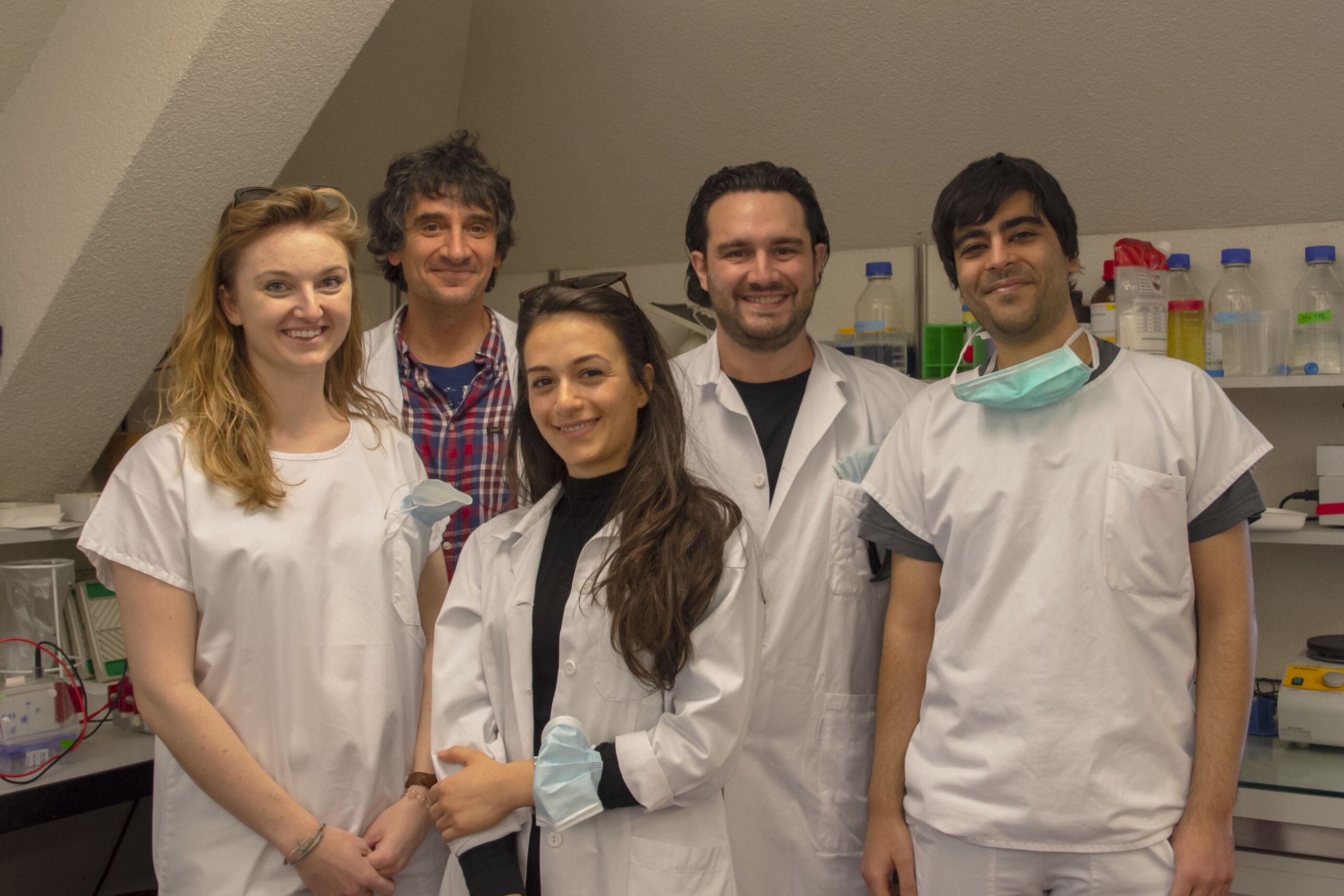Research activities in Inflammatory; infectious skin diseases of the Department of Dermatology
Research groups
Hans-Dietmar Beer
Main fields of research
Keratinocytes represent the main cell type of the epidermis. This outermost layer of the skin is directly exposed to numerous types of stress, including UVB radiation. Our research tries to elucidate the mechanisms, which are responsible for the maintenance of the integrity of the epidermis under stress conditions. A protein complex, termed NLRP1 inflammasome, plays important roles in different stress-induced processes of the epidermis, including sunburn, protection against viral infection, inflammatory skin conditions and skin cancer development. Since NLRP1-dependent mechanisms are only poorly conserved in other species, such as in mice, we are establishing novel models for skin research and protocols for the stable genetic manipulation of human primary keratinocytes and skin cancer cells by state-of-the-art methods. In addition, we are interested in understanding how anti-inflammatory drugs modulate inflammasome expression and activation.
PublicationsGroup members
Group Members:
Paulina Hennig, PhD
Michela Di Filippo, PhD
Marta Slaufova, PhD student
Tugay Karakaya, PhD student

Philipp Bosshard & Yvonne Achermann
Main fields of research of Philipp Bosshard
Our research activities focus on skin infections and pathogen-host-interactions. This comprises research on bacterial infections (e.g. syphilis and other sexually transmitted infections), fungal infections (e.g. dermatophytoses) and the human skin microbiome. Our interests among others are to develop and improve diagnostic tools for infections (e.g. PCR, serology, resistance testing), epidemiological studies and elucidating the role of the human skin microbiome in inflammatory skin diseases such as atopic dermatitis.
PublicationsMain fields of research of Yvonne Achermann & Philipp Bosshard
Since 2020, we lead a research group focusing on postoperative orthopedic infections. Our main research project “Photodynamic treatment to prevent and treat periprosthetic joint infections” has started with the hypothesis that photodynamic therapy (PDT) on the skin improves skin antisepsis and with that prevents deep orthopedic implant-associated infections. Furthermore, we focus on diagnostic tests to improve diagnostic sensitivity for explanted foreign materials, potentially contaminated with common skin colonizing microorganisms. In parallel, we study novel intra-operative treatment options for skin pathogens infecting foreign material in orthopedic surgery. In order to achieve these goals, we combine laboratory work, with a special emphasis on the development and use of humanized preclinical models to replace animal models, together with clinical research. All projects benefit from multi-disciplinary collaborations.
PublicationsGroup members
Yvonne Achermann, PD Dr. med., Principle Investigator
Tiziano Schweizer, PhD
Daniela Egli, Study Nurse
Antonios Kolios
Main fields of Interest
Our research focuses on autoimmune and inflammatory skin diseases. A special interest includes restoration of immune tolerance and targeted personalized treatment approaches. Our research integrates translational questions with clinical relevance. Therefore, we use state-of the art methods to uncover disease mechanisms incl. flow cytometry, scRNAseq, transcriptomics, proteomics, and spacial tissue profiling in blood and skin.
In autoimmune diseases, we focus on immune dysbalance investigating immune regulation towards the interaction of regulatory T cells and effector cells and how this delicate balance can be influenced by novel and potential treatment options. Special focus is on vitiligo, cutaneous lupus, psoriasis, hidradenitis suppurativa and pityriasis rubra pilaris (PRP). Recently, we discovered potential pathways which may represent promising treatment targets or which are in translation to clinical applications.
Group members
Gabriela Lerner, Pract. med., doctoral candidate
Jeivicaa Thevan, medical student, doctoral candidate
Corinne Stoffel, PhD, Postdoc
Yuliya Dahlem, MD, doctoral candidate
Ken Goekcimen, medical student, research associate
Barbara Meier-Schiesser
Main fields of research
Inflammatory skin diseases are frequent in number and often lead to a decreased quality of life in the affected patients. Our research focuses on the study of immune pathways leading to lichenoid skin reactions including the frequent inflammatory skin disease Lichen planus with its several subtypes, as well as drug-induced lichenoid reactions (e.g. by checkpoint inhibition). We aim to characterize the different forms of lichenoid skin reactions using integrated transcriptomic profiling with surface proteomics on a single cell level, multiplex imaging analyses, high-dimensional single-cell analysis (Time of Flight Mass Cytometry) of blood cells, followed by the investigation of the molecular mechanism using a novel three-dimensional skin-equivalent model. The aim of our research is to identify key molecules as targets for future therapies of these difficult-to-treat skin diseases.
PublicationsGroup members
Julia Laube, MSc, laboratory assistant
Vivienn Kaiser, MD, study doctor
Cadri Knoch, MD, doctoral candidate
Patrick Poffet, MD, doctoral candidate
Ramon Staeger, MD PhD candidate
Martina Steiger, BSc, master student
Julia-Tatjana Maul
Main Fields of Research
Our main research activities are focused on inflammatory skin diseases, with a particular emphasis on psoriasis, a highly stigmatizing disease that affects patients both physically and mentally, leading in most cases to poor quality of life and increased risk of severe comorbidities. Despite the highly efficacious treatment options since the introduction of specific therapies targeting key cytokines involved in the pathogenesis such as TNFα, IL-17 and IL-23, many clinical and immunological questions remain. Our goal is to investigating the drug survival of biologics and conventional systemics, sex and gender differences in treatment response and access to treatment, as well as the underlying immunological mechanisms involved.
PublicationsGroup members
J. Birkenmaier (PhD Doctorate)
S. Steinmann (medical doctorate)
F. Veradi (medical doctorate)
N. Hermann (medical doctorate)
F. Fröhlich (resident physician)
R. Lichtenberger (doctoral candidate)
M. AK (resident physician)
Vivienn Kaiser



